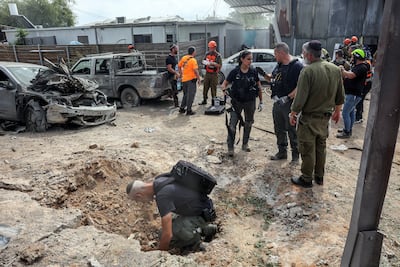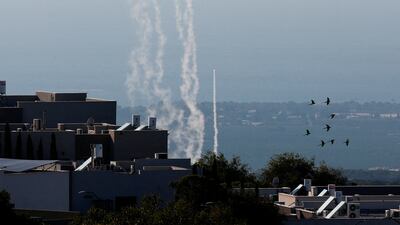Live updates: Follow the latest on Israel-Gaza
Daniel Shely has trained his two dogs, a shih tzu and a chihuahua, to run to the bomb shelter every time the sirens blare.
For the 35-year-old Israeli software developer, who lives in Jaffa in southern Tel Aviv, the past year has meant living in a more politicised and, he believes, less secure country.
The war and the threat of attacks feels like “a very big rock on my shoulders”, Mr Shely told The National. On the surface, life appears to be continuing as normal in Tel Aviv, a lively, cosmopolitan city that is among the most liberal places in Israel. But underneath, the city’s population is stressed, he said in the Tel Aviv offices of Standing Together, a donations-funded human rights organisation of which he is a member.
“All of us are a little bit post-traumatic – traumatic, actually,” he said, correcting himself. Things could be a lot worse, he acknowledges, pointing to the tens of thousands of Israelis who have had to leave their homes in northern Israel due to daily rocket fire from Hezbollah, or the complete destruction of homes and lives in Gaza. More than 43,100 people have been killed in the past year in the strip, Palestinian officials say.
Tel Aviv’s residents have lived with the threat of rocket fire from Gaza for a year. Following the Hamas attacks on October 7, 2023 and the start of Israel’s military operations in Gaza, militants in the strip launched rockets into southern and central Israel on a daily basis. As Hamas’s ability to launch rockets has been slowed by Israeli operations in the enclave, the pace of the attacks has lessened, sometimes with months-long lulls between incidents.
The city has not seen the worst-case scenario, which would involve thousands of rockets overwhelming missile defences, power cuts caused by attacks on energy infrastructure, and hospitals struggling with mass casualty events.

But there still remains the threat of rockets and larger-scale missiles from Lebanon and Iran, as well as drones, which are smaller and harder for missile defence systems to detect and shoot down. Hezbollah has launched more than 10,000 projectiles at Israel since it joined the war in support of Hamas on October 8 last year, according to the Israeli military. Most of them are shot down or land in northern Israel, but some make it further south.
“When it comes to Lebanon, it's a little bit different, because they have more sophisticated capabilities, and you never know if it's the beginning of a bigger onslaught,” said Mairav Zonszein, a senior Israel analyst for the International Crisis Group, in an interview with The National. “I think Israelis have already felt unsafe since October 7, so the Lebanese element isn't necessarily making it much greater, but it adds a layer of endlessness – 'when is this going to end?' – that type of thing.”
Iran-backed Hezbollah says it avoids civilian targets, knowing that Israel’s subsequent response to its civilians being killed or injured would be more forceful than when soldiers are killed. But locations that the group considers legitimate military targets sit amid dense civilian infrastructure and populations in cities like Tel Aviv.
“By now we can certainly say that it's not a problem of capability, and it's not a problem of willingness,” Raz Zimmt, a senior researcher at the Tel Aviv-based Institute for National Security Studies, told The National. “Hezbollah and Iran, but also other Iranian proxies, including the Houthis, have made it very clear that, first, they are willing to do that [launch attacks], not because they want to target civilian targets inside Israel, but because Tel Aviv is one of the centres for Israel's military as well.”
In late August, Hezbollah claimed to have targeted 11 Israeli military sites, including one near Tel Aviv, with more than 320 Katyusha rockets and drones, as a retaliation for the assassination of its senior commander Fouad Shukr.
A month later, the Iran-backed group said it had launched its first missile attack towards Tel Aviv, launching a Qadr 1 ballistic missile towards the headquarters of Israel’s intelligence service Mossad in Herzliya, just north of the city. The David’s Sling defence system shot down the projectile, without casualties or damage, the Israeli military said. In October, a Hezbollah drone attack on a military base between Tel Aviv and the city of Haifa killed four Israeli soldiers.

Yoav Gallant, Israel’s Defence Minister, claimed earlier this week that Hezbollah has only 20 per cent of its rocket and missile arsenal remaining. Israel has intensified attacks on the stockpiles since starting a ground operation in Lebanon five weeks ago. Still, over the week between October 22 to 29, Hezbollah was able to fire an average of 138 projectiles across the border every day, according to The National's calculations based on Israeli military figures.
The order of magnitude of launches is significant because of the limitations of Israel’s missile defence systems, which will fail to shoot down around 10 per cent of projectiles. The lower the number of overall projectiles, the lower the number of those that manage to penetrate the defences and hit Israel.
Tel Aviv's residents feel that the war continuing is making them less safe.
“You can see the correlation between us doing big operations, like assassinations of [Hassan] Nasrallah, and [Yahya] Sinwar, and how we are being bombed and attacked more and more, and how we lose more and more soldiers,” Mr Shely said.
Another threat to Tel Aviv is the direct confrontation between Israel and Iran. Missiles struck near the Ayalon shopping mall in north-eastern Tel Aviv during Iran’s direct attack on October 1, in which Tehran launched at least 180 cruise and ballistic missiles towards Israel in response to the assassinations of senior Hamas and Hezbollah leaders in the region.
It was Iran's second direct attack on Israel this year: in April, it launched a large-scale missile and drone attack in response to a suspected Israeli strike on its embassy building in Damascus.
26
The Ayalon mall was operating as usual on Wednesday this week. Shoppers milled around stores selling loungewear and sat for coffee in cafes in the central atrium. Others filled trolleys with groceries at the hypermarket attached to the shopping mall.
“I think the biggest threat right now is maybe from Iran – just based on what they did that night,” said Ms Zonszein, referring to the October 1 attack. “That night was very intense for a lot of people in Israel, and it covered almost the entire country. It put us in shelters for almost an hour. In terms of the effect on the public, that was the most potent.”
Iran will want to retaliate for Israel's response last week to the October 1 attack, which is widely believed to have taken out some of Iran's air defence systems and missile production capacity.
On the one hand, Iran wants to retaliate, and is also constrained by Israeli damage caused to its aerial defence and missile capabilities last week, the US election, and the risk of scuppering a ceasefire agreement in Lebanon, which Tehran wants to see come to fruition, explained Mr Zimmt.
“I think that today, even more than in April and October, the dilemma in Iran is very painful,” he said.
Like Mr Shely, Ella Lotan, 26, feels that continuing hostilities is not the right course of action and the only way to bring long-term stability to Israelis and Palestinians is a ceasefire deal and the release of the hostages who remain held in Gaza.
“I don't feel like any war will make us more safe,” said Ms Lotan, Standing Together's coordinator at the Hebrew University in Jerusalem. “Only peace can bring security,” she said in an interview with The National in Tel Aviv. She cited peace agreements with Jordan and Egypt that have kept those countries’ relations with Israel relatively stable for decades.
The Israeli government is not interested in a deal that would bring the hostages home, according to Avi Zilberstein, 61. He is one of a team of volunteers who take turns sitting at a tent in Tel Aviv to commemorate those taken from and killed at kibbutz Nahal Oz on October 7, 2023. The tent is at the “Hostages Square”, an open plaza in the city that has become a memorial space for the 101 hostages still held in Gaza. The Israeli government says returning the hostages remains one of its priorities.

Mr Zilberstein comes and sits in the open space, next to Israel’s Ministry of Defence, on Wednesdays and has become grown accustomed to the threat of rocket and missile attacks. “When you live here, you get used for everything,” he said.
Mr Zilberstein believes the Israeli government should reach a ceasefire deal with Hamas, both to bring home the hostages and end the war. “Although we have been at war for a year [ …] they still manage to send rockets,” he said. “At the end of the day, I think you need to make an agreement.”


